Record of Accomplishments
1998
Founded in Rockport, Maine as Environment Northeast
One of the first organizations created in the United States to focus on climate solutions at the state and regional levels, Acadia Center has had significant impact in the northeast region with application to other parts of the country and Canada and overseas. Please see “We Have to Be Bold” to learn more.
1999/2000
 Initiated the Connecticut Energy Conservation Management Board
Initiated the Connecticut Energy Conservation Management Board
The Connecticut Legislature adopted our proposal to create the first inclusive stakeholder board consisting of consumer, environmental, business, low-income and state agency representatives, to decide on budgets, savings goals and program design. Participating stakeholders represented consumer, low income, small and large business consumers, municipalities, state agencies, clean energy advocates and others. This board provides a fact-based process that reached consensus among previously fractious parties.
2001

Produced “Protecting Our Biosphere” Report
This report, with support from Rockefeller Brothers Fund, created one of the first analyses showing how the U.S. could start on the path to reducing climate pollution. We laid out 5 specific steps and calculated the economic cost to be $5 billion, around what the nation spent on chewing gum.
2003
 Climate Change Roadmap for Connecticut
Climate Change Roadmap for Connecticut
Acadia Center conceived and created the first comprehensive climate roadmap at the state level produced by a non-profit policy and advocacy organization. The roadmap influenced climate progress in Connecticut and many other states and was downloaded around the planet. In Connecticut, our work helped pass the state’s first climate law in 2004, setting the first state goal for reducing emissions in 2050 by 80%.
2004
 “Green Power” Purchasing Campaign
“Green Power” Purchasing Campaign
Our staff led the development of some of the first Renewable Portfolio Standards, which mandates utilities purchase minimum amounts of clean energy in many states in our region and stayed at the table to influence continued expansion of these mandates. Over the past 20 years, due to these and the efforts of many, the power grid in New England has seen its reliance on dirty fuels like coal and oil drop to virtually zero while renewables and energy efficiency have grown.
2004
 ClimateVision 2020
ClimateVision 2020
Acadia Center assessed the progress of states in meeting targets established in the growth of state climate laws adopted in 2004 and after.
2006
 Climate Change Roadmap for New England and Eastern Canada
Climate Change Roadmap for New England and Eastern Canada
We authored the first multi-state, regional climate roadmap in North America, showing how 6 New England states and 5 Canadian provinces could adopt practical, effective approaches to reducing emissions in housing, energy, transportation, land use and agriculture.
2006
 Rhode Island’s Energy Efficiency and Resource Management Council
Rhode Island’s Energy Efficiency and Resource Management Council
Acadia Center authored the creation of the Energy Efficiency and Resource Management Council representing over 10 consumer, low-income, business and other stakeholders. RI’s energy efficiency plan soared from $16 million to over $100 million as a result of consensus agreement by the parties. We provided key recommendations and drafting for the new state energy law, that also established the first requirement on a utility to plan for clean energy resources like community solar and wind.
2006
 Tackling the Damage from Diesel Truck Emissions
Tackling the Damage from Diesel Truck Emissions
Acadia Center created and led the New England Diesel Reduction Initiative (NEDRI), a regional coalition of community and health advocates in Connecticut, Massachusetts and Rhode Island who advanced awareness and funding solutions to clean up diesel emissions. Acadia Center staff organized health professionals and students to monitor exhaust emissions from trucks on highway off ramps in New Haven, CT and Providence, RI, documenting the spikes in particulate matter and black carbon. In Massachusetts, NEDRI led to a $50 million fund to install particulate traps on all school buses, waste haulers, and transit buses.
2006-2009
 All Cost-Effective Energy Efficiency (ACE) Policy
All Cost-Effective Energy Efficiency (ACE) Policy
We developed the All-Cost-Effective Energy Efficiency (ACE) policy which was adopted as official state policy in Massachusetts, Connecticut, Rhode Island and Maine starting in 2006 through 2009.
The results were dramatic:
- Massachusetts’ energy efficiency program expanded 4-fold – from $125 million year to $540 million/year.
- Rhode Island expanded from $16 million to over $100 million.
- Connecticut more than doubled its energy efficiency program.
- We conceived of and successfully advocated for the creation of Efficiency Maine, which began offering the state’s first real energy efficiency programs to all customers.
- The New Hampshire Board drew from the examples of our other boards
2008
 Received the ACEEE Champion of Efficiency Award
Received the ACEEE Champion of Efficiency Award
The ACEEE award is among the most prestigious in the energy efficiency field and recognizes leadership and accomplishments. Winners are selected based on demonstrated excellence in program implementation, research and development, energy policy, or private sector initiatives. Acadia Center, then Environment Northeast, won for shepherding policies that engaged stakeholders, increased energy efficiency investments, and institutionalized support for energy efficiency throughout New England.
2008

Massachusetts Energy Efficiency Advisory Council
Acadia Center authored the creation of a new stakeholder body to guide Massachusetts’s energy efficiency efforts, composed of twelve stakeholders representing a wide range of interests including environmental justice. Consensus agreement led to a four-fold increase in budgets available to assist consumers and the highest energy savings goals in the United States.
2009
Efficiency Maine Trust
We worked to shape the stakeholder board concept in Maine, which led to the creation of Efficiency Maine Trust (the Trust), the administrator for programs to improve the efficiency of energy use and reduce greenhouse gases in Maine. The Trust serves all sectors and all regions of the state. Its suite of programs provides consumer information, rebates, and loans for the purchase of high-efficiency, clean energy products. Efficiency Maine recently was honored for more than a decade of accomplishments at a United Nations event in 2021.
2009
 Regional Greenhouse Gas Initiative
Regional Greenhouse Gas Initiative
Acadia Center has been a leader in advocating for the design of the Regional Greenhouse Gas Initiative (RGGI), the nation’s first multi-state agreement to limit emissions from power plants. RGGI has created over $4 billion in revenue for states to reinvest in clean energy, energy efficiency, consumer support to shift off fossil fuels and many other beneficial uses. It is the nation’s first multistate climate accord, and we are now working to prioritize investments in communities historically damaged by fossil fuel energy infrastructure.
2009
 U.S. EPA Region One Environmental Merit Award
U.S. EPA Region One Environmental Merit Award
EPA New England has honored those who have made outstanding contributions to protect New England’s environment. The Environmental Merit Awards recognize accomplishments during the past year and over a lifetime.
2012
 ISO-NE Grid Modernization
ISO-NE Grid Modernization
Acadia Center played a key leadership role in advocating that ISO-New England incorporate the benefits of energy efficiency when planning power needs. In 2012, ISO-NE folded into their 10-year forecast of power on the power grid – the first regional grid operator to do so in the country – leading to the cancellation of over $400 million in planned upgrades to the transmission system that were no longer needed because of the benefits of efficiency. The region now relies on 12% of its power needs from the energy savings produced by these nationally leading programs – the highest in the United States, saving consumers billions of dollars in spending.
2012
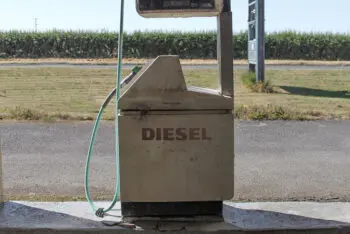 New England Diesel Reduction Initiative (NEDRI)
New England Diesel Reduction Initiative (NEDRI)
Acadia Center created and led the New England Diesel Reduction Initiative (NEDRI), a regional coalition of community and health advocates in Connecticut, Massachusetts and Rhode Island who advanced awareness and funding solutions to clean up diesel emissions. The project targeted priority fleets like waste haulers, school buses and transit buses in disadvantaged communities. Acadia Center staff organized health professionals and students to monitor exhaust emissions from trucks on highway off ramps in New Haven, CT and Providence, RI, documenting the spikes in particulate matter and black carbon that damage the health of children and the elderly and act as a powerful greenhouse gas.
2014/2015
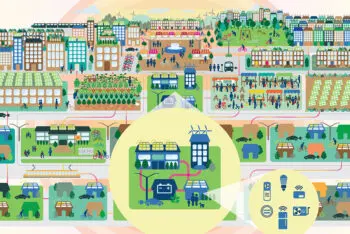 Community|EnergyVision
Community|EnergyVision
Community|EnergyVision is a comprehensive framework that outlines a pathway for communities to take control of the energy system and modernize the way it is planned and managed. The illustrated publication details the full range of relevant issues surrounding Community Energy and provides examples of successful Community Energy systems emerging in the U.S. and abroad.
In 2015, Acadia Center was featured in U.S. News & World Report’s “How to Put Your Money to Good Use” list of charities for Giving Tuesday; included in MarketWatch’s “10 little-known charities that do the most good” list; received a near-perfect score from Charity Navigator and once again landed on their “Top 10 Charities Worth Watching” list; and appeared on New York Magazine’s annual list for “The (Particularly Timely) Charities to Donate to” in 2015 & 2016.
2015
 UtilityVision
UtilityVision
UtilityVision presented an ambitious but realistic energy future that puts the consumer firmly in the center. It outlined the specific steps needed to create a new energy system that both meets our needs and supports a fair, healthy economy and environment. Like many Acadia Center materials, UtilityVision influenced decision makers and colleagues and offered clarity to the media on how the system can adapt to new priorities.
2016
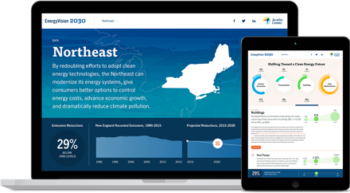 EnergyVision 2030
EnergyVision 2030
EnergyVision provided the first clear story of how clean energy technologies can replace fossil fuel use for building heating, transportation, and electricity generation and combine to offer the region a clear pathway to a low emissions future that economically can benefit all residents. EnergyVision 2030 provides specific detail and creative interactive web tools showing how progress could be achieved in expanding clean energy at the state and regional levels to meet climate targets by 2030 in 7 states in the northeast.
2019
 City of Providence’s Climate Justice Plan
City of Providence’s Climate Justice Plan
Acadia Center was a core participant in the work that developed the City of Providence’s Climate Justice Plan, an equitable, low carbon, climate resilient plan for Providence’s future. Acadia Center developed climate and energy trends and data and recommended policy pathways.
2020
 Clean Heating Pathways Report
Clean Heating Pathways Report
This Acadia Center report offers consumer information on air source heat pumps and sets out seven paths that states and cities can take to support adoption of clean heating technologies to reduce emissions and provide important benefits like lowering heating costs and eliminating health and safety risks of carbon monoxide poisoning and explosions.
2020
 Aquidneck Island Analysis
Aquidneck Island Analysis
After National Grid released its long-term energy analysis, which ignored clean energy strategies available in favor of expensive gas infrastructure, the people of Aquidneck Island voted down National Grid’s approach, favoring clean energy. Our analysis showed future energy needs could be met by imposing a moratorium on gas expansion and installing electric heat pumps and heat pump water heaters at a cost of under $27 million—less than National Grid’s lowest cost solution of $31 million.
2021
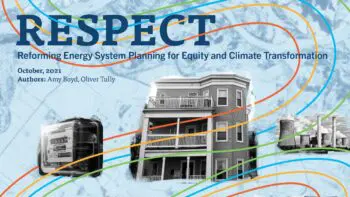 RESPECT (Reforming Energy System Planning for Equity and Climate Transformation)
RESPECT (Reforming Energy System Planning for Equity and Climate Transformation)
Acadia Center created an innovative, practical approach to reshape the role of the modern electric and gas utility. The RESPECT framework was distributed widely in November and December 2021 and has garnered significant interest from peer groups, legislators, and energy regulators in multiple states and regional bodies.
In 2022, we implemented six new initiatives:
Energy Efficiency and Building Energy Justice Initiative
Utility Innovation Initiative
Climate, Energy, and Equity Analysis Center (CLEAN-E)
Clean Energy and Grid Reform Initiative
Transportation, Climate and Equity Initiative
Beyond Gas Initiative
2022
 Giving States Authority to Address Climate, Equity and Environmental Justice
Giving States Authority to Address Climate, Equity and Environmental Justice
Acadia Center proposed successful changes to expand the authority of key state regulatory agencies like the public utilities commissions to address climate, equity, and environmental justice. Our proposals were adopted in Maine and Massachusetts. We worked with state and coalition partners to require utilities to plan ways to upgrade their systems to meet state climate goals and be accountable to public interest priorities.
2022
 Transportation Legislation Wins
Transportation Legislation Wins
- Allocated $3.5 million to Efficiency Maine Trust for the state’s electric vehicle (EV) incentive program; and
- Established a goal that 50% of the State’s new light-duty vehicles purchased by 2025 be plug-in hybrid or zero-emission vehicles by 2025 and 100% by 2030. County and municipal governments have a goal for light-duty vehicle acquisitions of 100% plug-in hybrid or zero-emission vehicles by 2035.
2023
 Formed the Northeast Grid Planning Forum
Formed the Northeast Grid Planning Forum
In 2023, Acadia Center and the Quebec-based clean energy organization Nergica, with experts from both sides of the border, began convening an ambitious project called the Northeast Grid Planning Forum to create a focused dialogue for enhanced cross-border energy collaboration. The Northeast Grid Planning Forum will spur conversations to imagine a power grid that conducts itself according to public interest.





















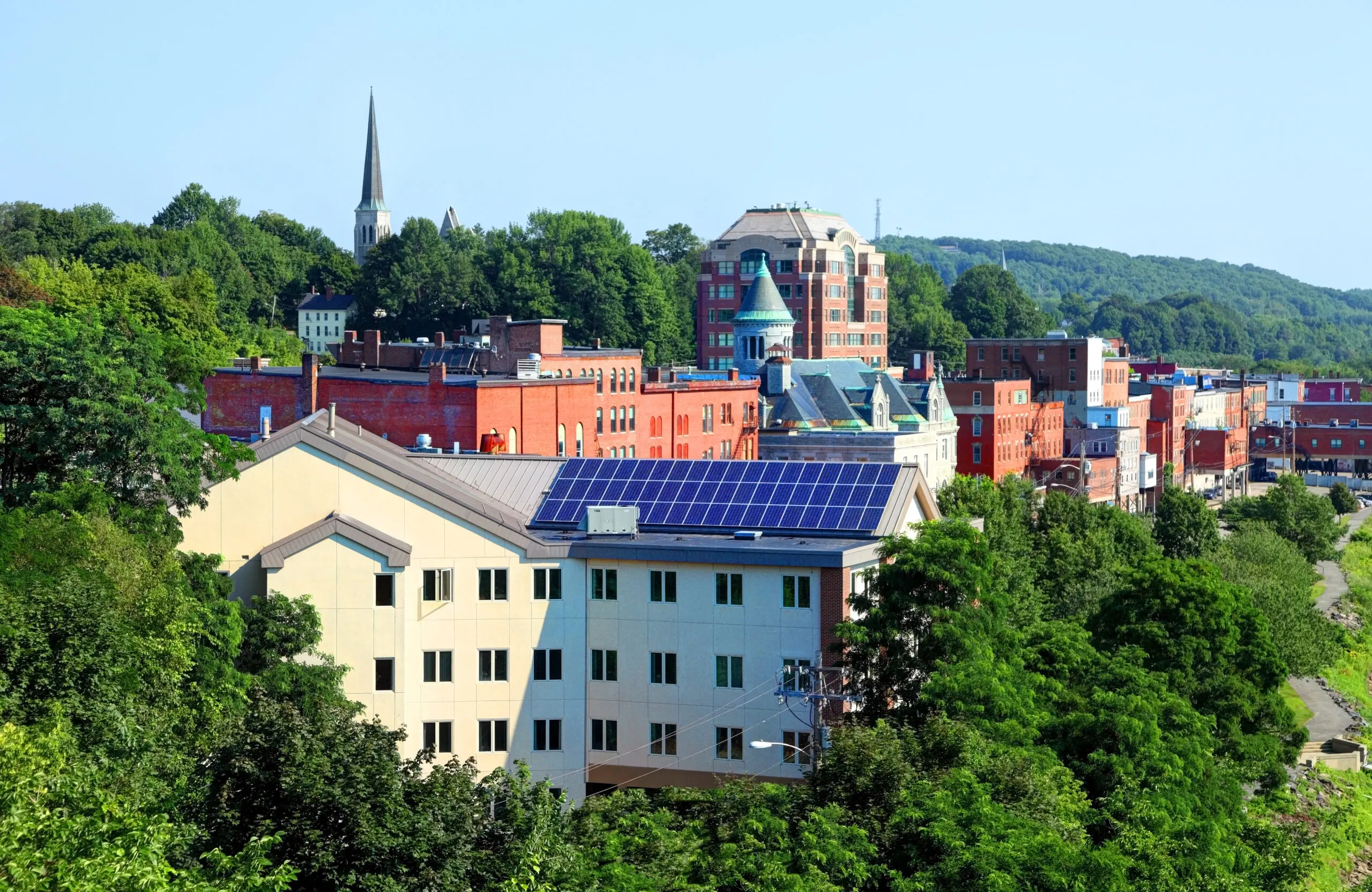
Follow us